Module 2 Unit 5 Magazine articles 第1课时课本讲解及词汇拓展 课件+嵌入音频(共70张PPT)
文档属性
| 名称 | Module 2 Unit 5 Magazine articles 第1课时课本讲解及词汇拓展 课件+嵌入音频(共70张PPT) |
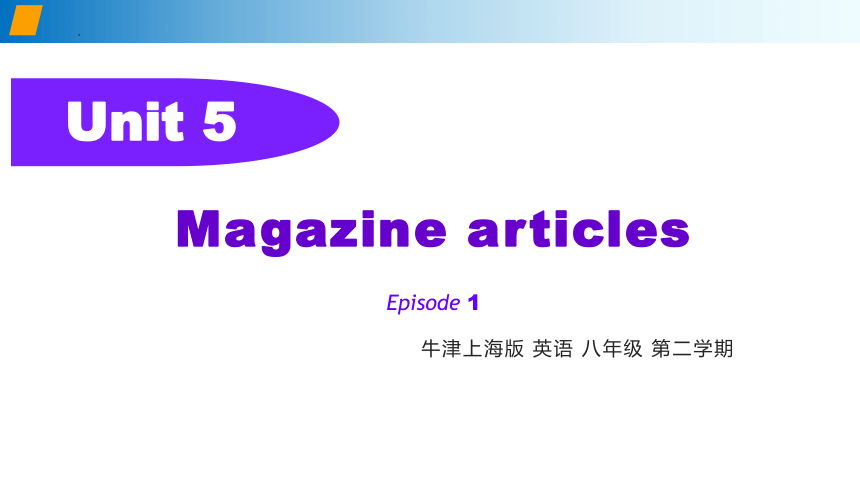
|
|
| 格式 | pptx | ||
| 文件大小 | 9.8MB | ||
| 资源类型 | 教案 | ||
| 版本资源 | 牛津上海版(试用本) | ||
| 科目 | 英语 | ||
| 更新时间 | 2023-04-04 06:40:21 | ||
图片预览

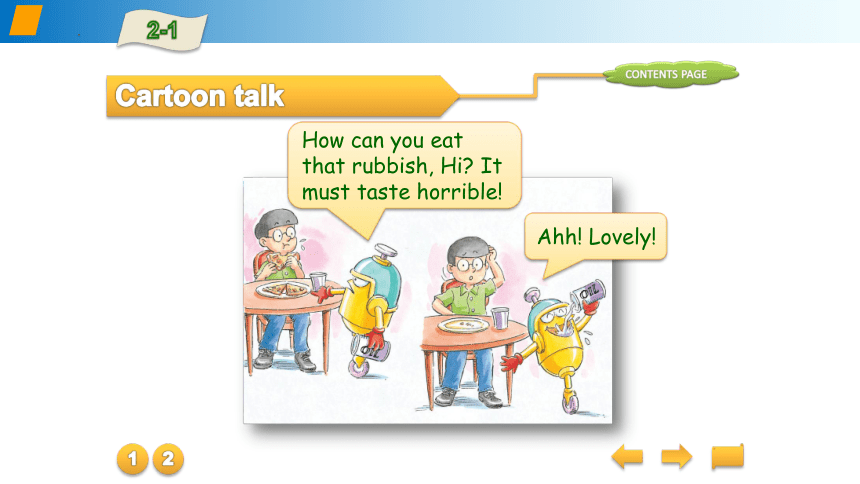
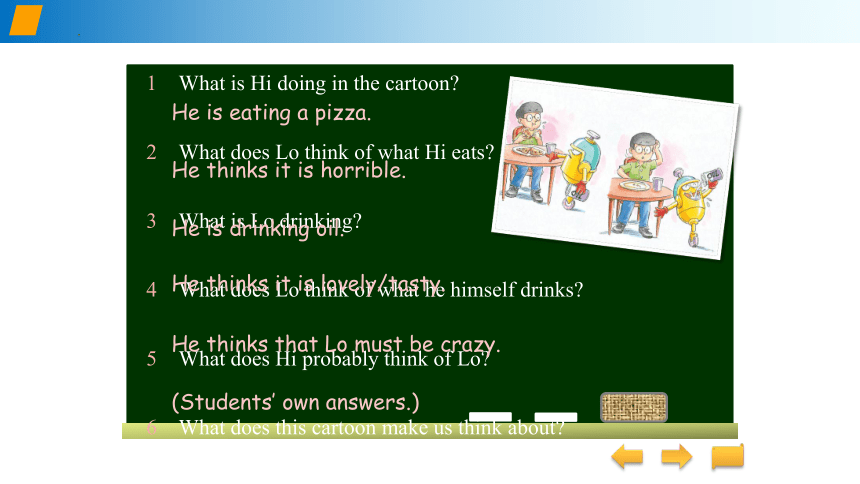
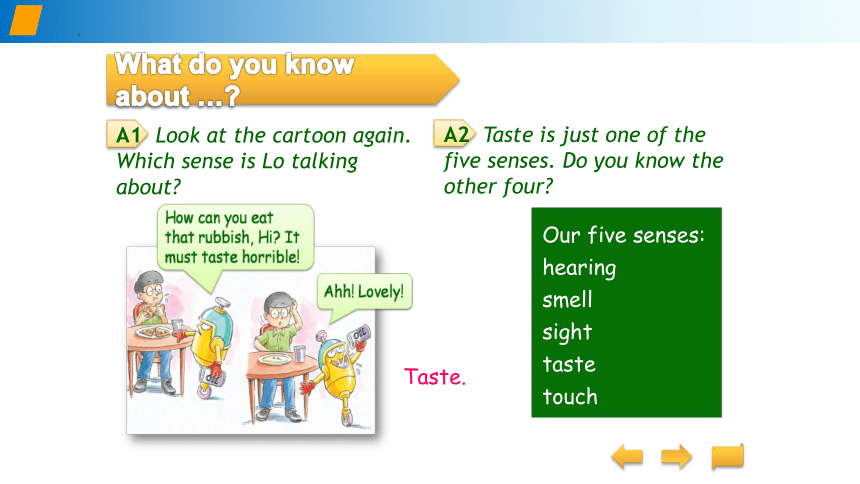




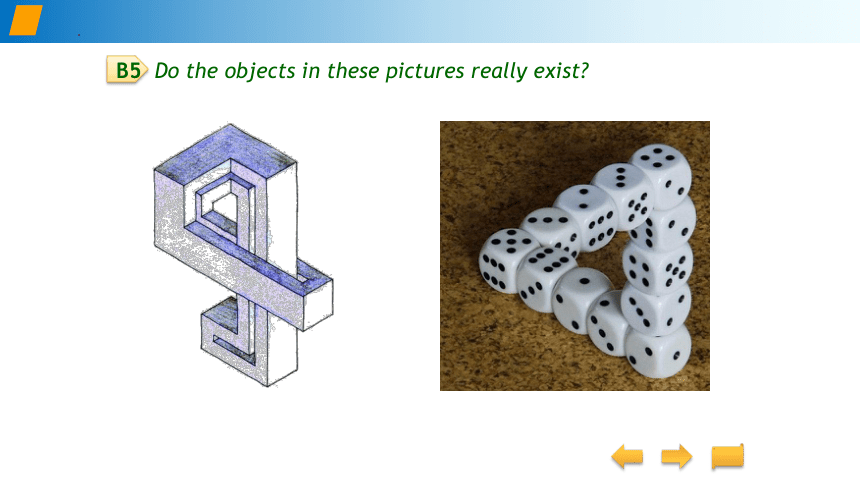
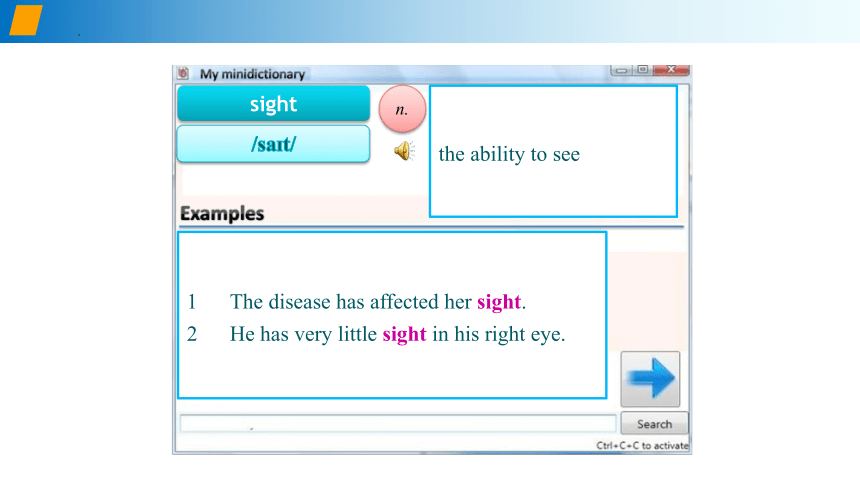
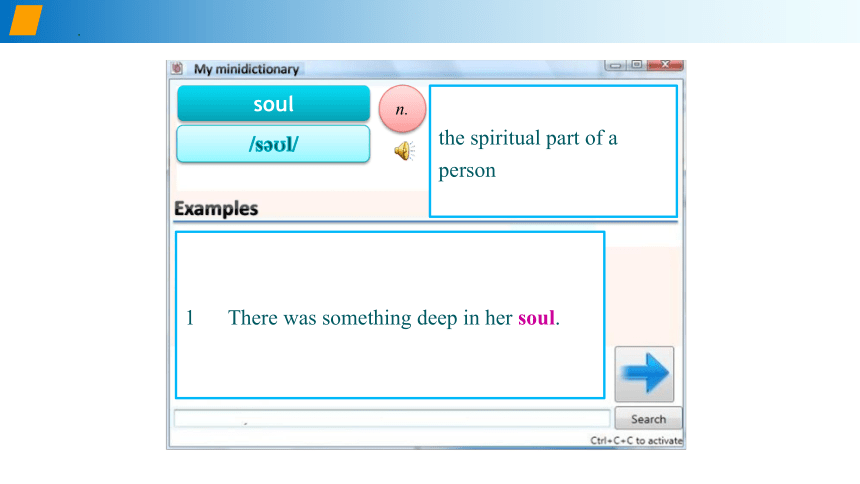
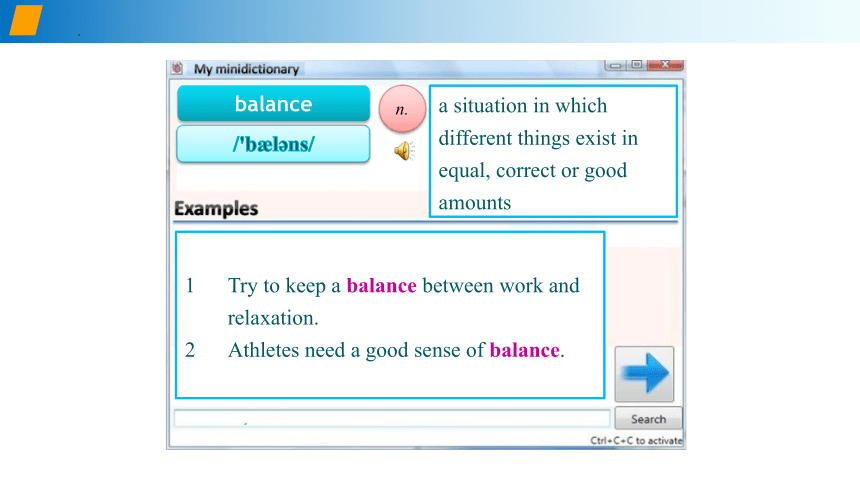
文档简介
(共70张PPT)
Magazine articles
牛津上海版 英语 八年级 第二学期
Unit 5
Episode 1
Cartoon talk
2-1
1
2
How can you eat that rubbish, Hi It must taste horrible!
Ahh! Lovely!
What is Hi doing in the cartoon
What does Lo think of what Hi eats
What is Lo drinking
What does Lo think of what he himself drinks
What does Hi probably think of Lo
What does this cartoon make us think about
He is eating a pizza.
He thinks it is horrible.
He is drinking oil.
He thinks it is lovely/tasty.
He thinks that Lo must be crazy.
(Students’ own answers.)
What do you know about …
A1 Look at the cartoon again. Which sense is Lo talking about
Taste.
A2 Taste is just one of the five senses. Do you know the other four
Our five senses:
hearing
smell
sight
taste
touch
B1 Match the five senses with the pictures.
a
b
c
d
e
hearing
smell
sight
taste
touch
B2 Answer these questions.
Which of the body parts above is often called ‘the window to the soul’
Which of the body parts above helps us keep our balance so that we do not fall down
Which of the body parts contains a drum
Which sense sometimes stops working when you have a cold
Which sense uses your tongue
Which sense covers your whole body
the eye
the ear
the ear
smell
taste
touch
e
f
g
h
ef = gh
Can you always believe what your senses tell you
Look at the following. Which lines are longer, ab or cd, ef or gh
a
b
c
d
ab = cd
B4 Look at the centre of the picture for 30 seconds. What happens Can you tell the reason
B3 Which circle is bigger The green one or the purple one
They are of the same size.
B5 Do the objects in these pictures really exist
sight
/sa t/
n.
the ability to see
The disease has affected her sight.
He has very little sight in his right eye.
soul
/s l/
n.
the spiritual part of a person
There was something deep in her soul.
balance
/'b l ns/
n.
a situation in which different things exist in equal, correct or good amounts
Try to keep a balance between work and relaxation.
Athletes need a good sense of balance.
line
/la n/
n.
a long thin mark on a surface
Draw a thick black line across the page.
belong to
/b 'l /
be part of a particular group, type or system; be owned by somebody
Lions and tigers belong to the cat family.
Who does this watch belong to
drama
/ drɑ m /
n.
an exciting event
A powerful human drama was unfolding before our eyes.
as soon as
immediately after
I will phone you as soon as I get to Beijing.
exclaim
/ k skle m/
v.
say something suddenly and loudly, especially because of strong emotion or pain
‘It isn’t fair!’, he exclaimed angrily.
She opened her eyes and exclaimed in delight at the scene.
bark
/bɑ k/
v.
(dogs) make a short loud sound
The dog suddenly started barking at us.
at once
immediately; without delay
Come here at once!
guest
/ɡest/
n.
a person that you have invited to your house or to a particular event that you are paying for
We have guests staying this weekend.
lead (led, led)
/li:d/
v.
take somebody somewhere
The tour guide led the group to the tourist attraction.
personally
/ p s n l /
adv.
by oneself
All letters will be answered personally.
sensible
/ sens bl/
adj.
wise
It was very sensible of you to bring an umbrella in this weather.
describe
/d skra b/
v.
say what somebody/ something is like
Can you describe him to me
The man was described as tall and dark, and aged about 20.
go off
make sudden noise
When the fire alarm went off, everyone moved to the playground.
surface
/ s f s/
n.
the outside or top layer of something
Dead leaves floated on the surface of the water.
dead
/ded/
adj.
not working
The battery went dead after long hours of use.
cough
/k f/
v.
force out air suddenly and noisily through your throat, for example when you have a cold
I couldn’t stop coughing.
seem
/si:m/
v.
appear
Jane did not seem to be very happy today.
wave
/we v/
v.
move your hand or arm from side to side in the air in order to attract attention, as a greeting, etc.
The people on the bus waved and we waved back.
Why did you wave at him
save one’s life
keep somebody alive
The solider saved that little girl’s life.
lend
/lend/
v.
give something to somebody or allow them to use something that belongs to you, which they have to return to you later
I’ve lent the car to a friend.
Can you lend me your car this evening
event
/ 'vent/
n.
a thing that happens, especially something important
The election was the main event of 1999.
In the light of later events the decision was proved right.
二、新课单词讲解
1. blind adj. 瞎的;看不见的;盲目的
e.g. He is blind in one eye. 他的一只眼睛瞎了。
He is blind to his own faults. 他看不到自己的过失。
【知识拓展】 blindness n. 失明
2. drama n. 戏剧性事件,戏剧性场面
e. g. Why is there so little drama in my life
为什么我的生活如此平淡?
【知识拓展】dramatic adj. 戏剧性的
e.g. The play is a dramatic representation of a real event.
这出话剧改编自真人真事。dramatically adv. 显著地;突然地e.g. Her attitude to me changed dramatically.
她对我的态度突然大大改变。
3. reception n. 接待,接待处
e.g. We will give a warm reception to the guests.
我们将使客人受到热情的接待。
Leave your key at reception. 你把钥匙留在接待处。If you have any question, you may ask for information from the reception desk. 如果你有任何疑问,可到前台咨询。
【知识拓展】 receive v. 接受e.g. Please receive my best wishes for the New Year.
请接受我最诚挚的新年祝福。
4. initials n. 人名每一部分的第一个字母
e.g. Steven Lane's initials are S.L. . Steven Lane
这名字的缩写是S. L.。
5. book v. 预定
e.g. The secretary has booked the manager in at the Hilton Hotel. 秘书已经在希尔顿大酒店为经理预定了房间。
The hotel is fully booked up. 旅馆房间已经全部给人预定了。
【常用搭配】 book in预定旅馆房间,办理登记手续
e. g. The latest representatives booked in at 3 o’clock.
最后一批代表已经在三点钟报到了。
6. welcome adj. 受到欢迎的
e.g. You are always welcome in my home.
你在我家总是受欢迎的。
【知识拓展】 welcome v. 欢迎
e.g. Welcome to China. 欢迎来中国!welcome n. 欢迎e.g. They gave us a warm welcome.
他们给我们以热烈的欢迎。
7. allow v. 允许,承认e.g. Allow me to introduce Miss Mary. 请允许我介绍一下玛丽小姐。
The government servants aren't allowed to accept rewards.
公务员不得接受酬金。指点迷津:allow, permit与let(1) allow语气较弱,有“听任,不加阻止,默许”之意。 e.g. The teacher allows too much noise in the classroom.
那个老师听任学生大声吵闹。(2) permit语气较重,强调“认可,批准”。 e.g. Schools don't permit smoking. 学校内严禁吸烟。(3) let的语气最轻,意指“让”,口语较常用,且无被动语态。 e.g. Let me carry your luggage. 让我来帮你搬行李。
8. exclaim v. 吁喊,惊叫
e.g. The children exclaimed with excitement.
孩子们激动地喊了起来。
【知识拓展】 exclamation n. 惊呼,感叹,惊叹,惊叹词e.g.“Look out!"and“OW!"are exclamations.
“小心!”和“哎哟!”都是感叹词。
9. bark v. 吠,咆哮
e.g. Dogs always bark at strangers.
狗总是对着陌生人吠。
10. sound v. 听上去
这里的sound是个系动词,后接形容词或名词做表语。
e.g. His explanation sounds all right. 他的解释似乎有理。
Your idea sounds a good one. 你的想法听起来很好。
11. repeat v. 重做;复述
e.g. Could you repeat the question
你能把这个问题重复一下吗?
History will not repeat itself. 历史不会重演。
【知识拓展】 repetition n.重复,循环,复制品,副本
12. guest n. 客人,来宾,旅客
e.g. We are expecting guests this weekend.
我们本周末要来客人。
13. lead v. 引导,指引,导致
e.g. He led us to his home. 他把我们带到他家。
Her mistakes led to her failure. 她的失误导致了她的失败。【知识拓展】
leader n. 领导者 e.g. He is the leader of this movement. 他
是这次运动的领导者。
指点迷津: guide与lead
(1) guide是通用词,可以用于为别人带路,指导别人的学习、品行修养,它的内涵是避免走弯路或遇到危险。
e.g. The pilot guided the plane to a safe landing. 飞行员引导飞机安全着陆。
(2) lead可以表示“领导,带路”,但它总含有领导者走在前面,而把被领导者控制在自己的权威之下,或使被领导者处于秩序井然的状态中的意思。e.g. Our guide led us through a series of caves. 我们的向导带领着我们穿过一个接一个的洞穴。
14. personally adv.亲自;就本人而言
e.g. I thanked them personally. 我亲自感谢他们。
Personally, I think he is dishonest, but many people trust him. 就我个人而言,我认为他不诚实,可是有许多人信任他。
【知识拓展】
personal adj. 私人的,个人的,亲自的
e.g. This is a personal affair. 这是私人事情。
15. location n. 位置,场所
e.g. Have they decided on the location of the new building yet
这座新建筑的位置他们已经定下来了吗?
【知识拓展】 locate v. 使……坐落于; 位于
e.g. The new building will be located in the centre of the town. 这座大楼将建在市中心。
16. exit n. 出口
e.g. There are six emergency exits in a theatre.
剧院里有六个紧急出口。
【知识拓展】 反义词:entrance n. 入口e.g. There is a front and a back entrance to the house.
这个房子有一个前门和一个后门。
17. sensible adj.有感觉的,明智的,有判断力的
e.g. If you are sensible you will study for another year.
如果你明智的话,你就再学习一年。
He is sensible of the danger of his position.
他发觉他处境危险。
18. describe v. 描写,记述,形容
e.g. She described her childhood as a time of wonder and discovery. 她将她的童年描绘成一个充满幻想和发现的时期。
Words cannot describe the beauty of the scene. 语言难以描述出这景色的优美。
【常用搭配】 describe sb. as把某人说成是(称作)e.g. He described himself as a doctor. 他自称是医生。【知识拓展】 description n. 描写,记述,形容,描述e.g. The scenery was beautiful beyond description.
那风景美得难以形容。
19. surface n. 表面,外表e.g. The table had a shiny surface, but underneath it was dull and rough.这张桌子的表面很光亮,可是它的底下却又灰暗又粗糙。【常用搭配】
come to the surface 显露出来 look at the surface only 只看外表look below the surface of things看到事物的本质 on the surface表面上,外表上
20. wet v. 弄湿
e.g. Wet the clay a bit more before you start to mould it.
把泥再弄湿点再动手塑造。Although Eddie is eight years old, yet he still wets the bed sometimes.
尽管埃迪已经8岁了,但是有时候还会尿床。
【常用搭配】 wet out打湿;浸湿 wet up润湿,弄湿 wet the bed尿床 wet the whistle润喉
21. dead adj.死的,无知觉的,熄灭的
e.g. My dead fingers could not untie the knot.
我的手麻木了,解不开结。
If your fingers get very cold, they feel dead.
你的手指如果冻得过分,它们会失去知觉。
【知识拓展】 die v. 死,去世 death n. 死亡
22. cough v. 咳嗽
e.g. The child was coughing all night.
这孩子咳嗽了一整夜。
【知识拓展】 cough n. 咳嗽
e.g. The child had a bad cough, so his mother took him to the doctor.
这孩子咳得很厉害,所以他妈妈带他去看医生。
23. wave v. 挥手示意
【常用搭配】 wave to… 向……挥手示意
e.g. He waved desperately to his companion.
他绝望地向他的伙伴挥了挥手。
24. against prep. 相反,反对
e.g. No one is agarnst this proposal.没有人反对这个提议。
That's agarnst the law,那是违法的。指点迷津:against 与for两者都可表示方向,下图指明了两者的区别: for against●→ ←○ ←● ○→ 向着 逆着e.g. The Prince is making for the open sea while the princess is against.
王子号向着大海驶去,而公主号恰好驶回。
25. explain v. 解释,说明
e.g. Can you explain why you were late
你能解释一下你为什么迟到吗?
【知识拓展】 explanation n. 解释,解说,说明e.g. She left the room without explanation.
她什么也没说就离开了房间。
1.It’s said that most of the ________(die) firemen in the forest fire in Liangshan, Sichuan Province were in their 20s.
2.Look, the little cat is enjoying ________ (it) meal under the table.
3.I’m sorry to hear that he cut _________ (he). He should be careful.
4.My father is strict with ______ (he).
5.These scientists are visiting this country as ________ (guest) of the government (政府).
6.If you don’t leave now, you ________ (miss) the train. The train will start in very minute.
7.If we want to be successful, we should learn to depend on ________. (we)
8.I will win the first prize unless I make the ________ (careful) mistake.
9.The man is one of the most important ________ (guest) at the party.
10.The journey was a little boring. We didn’t enjoy ________ (we) at all.
随堂小练一
1.dead
【详解】句意:据说,四川凉山森林大火中遇难的消防员大多是20多岁的年轻人。观察句子结构可知,空格后的“firemen”是名词,需要由形容词来修饰,所给词die“死”,动词,其形容词形式为dead。故填dead。
2.its
【详解】句意:看,这只小猫正在桌子底下享受它的美食。根据“meal”可知,需要形容词性物主代词修饰名词,故填its。
3.himself
【详解】句意:听说他割伤了自己,我很难过。他应该小心点。根据“He should be careful.”可知,此处指他割伤了自己;cut oneself“把自己弄伤”,动词短语;由所给词“he”可知,反身代词要用himself“他自己”。故填himself。
4.himself
【详解】句意:我爸爸对自己要求很严格。根据"He”和“be strict with”可知后面跟he的反身代词himself。故填himself。
5.guests
【详解】句意:这些科学家以政府贵宾的身份拜访这个国家。根据“These scientists”以及所给的词汇可知,此处应用guest的复数形式,表示“政府的贵宾们”。故填guests。
6.will miss
【详解】句意:如果你现在不离开,你将会错过火车的。火车很快就要开动了。if“如果”引导条件状语从句,遵循“主将从句”原则,一般将来时的构成:主语+will+动词原形,故填will miss。
7.ourselves
【详解】句意:如果我们想要成功,我们应该学会依靠我们自己。depend on “依靠”,其施动者和受动者都是we“我们”,所以此处应填其反身代词,故填ourselves。
8.most careless
【详解】句意:除非我犯了最粗心的错误,否则我会赢得一等奖。根据空前“the”和所给的单词careful“细心的”可知此处应填形容词的最高级,分析“unless I make the…mistake.”可知指的是除非我犯了最粗心的错误,考查形容词careful的反义词careless “粗心的”,其最高级是most careless。故填most careless。
9.guests
【详解】句意:这个男人是聚会上最重要的客人之一。根据“one of the most important”可知,空格处填可数名词复数,guest的复数形式是guests。故填guests。
10.ourselves
【详解】句意:旅途有点无聊,我们玩得一点都不开心。enjoy oneself“玩得开心”,we的反身代词为ourselves。故填ourselves。
11.If it _____ (not rain) tomorrow, we’ll go for a picnic.
12.They are having a meeting on the ______ floor. (five)
13.You can ask your teachers or parents for help ________ (when) you have trouble.
14.—China’s high-speed railway technology ________ (lead) the world now.
—That’s true. It has developed rapidly over the past years.
15.He will leave for Shanghai as soon as he ________ (finish) his work.
16.The passengers found ________ (them) in a very dangerous situation and the flight dropped quickly.
17.If it _________ (snow) tomorrow, we can go skating in the park.
18.This is one of the most important ________ (event) of this year.
19.Please tell me how ________ (describe) this matter.
20.Millie asked ________ (she), “Did I really survive ”
随堂小练二
11.doesn’t rain
【详解】句意:如果明天不下雨,我们就去野餐。根据“we’ll go for a picnic”可知不下雨的话就去野餐,从句是否定句;根据条件状语从句的主将从现原则,从句需要用一般现在时,应填don’t/doesn’t rain。根据“it”可知,应填doesn’t rain,故填doesn’t rain。
12.fifth
【详解】句意:他们正在五楼开会。five“五”,基数词。根据“on the...floor”可知,此处表示在第五层楼,应用序数词,five的序数词为fifth“第五”。故填fifth。
13.whenever
【详解】句意:当你遇到困难时,你可以向你的老师或父母寻求帮助。when表示“当……时候”,根据“You can ask your teachers or parents for help...you have trouble.”可知,此处是指无论你什么时候遇到困难,你都可以向你的老师或父母寻求帮助,whenever“无论何时”。故填whenever。
14.is leading
【详解】句意:——中国的高铁技术正在引领着世界。——那是真的。在过去几年中已经飞速发展了。根据now可知,此处应用现在进行时,结构为be+doing,主语为不可数名词,be用is。故填is leading。
15.finishes
【详解】句意:他一完成工作就动身去上海。as soon as引导的时间状语从句遵循“主将从现”原则,主句为一般将来时,从句要用一般现在时;从句主语是he,动词应用第三人称单数形式。故填finishes。
16.themselves
【详解】句意:乘客发现他们自己处于非常危险的情况,并且航班迅速下降。根据题干可知主语是The passengers,而宾语同样指代乘客,应用反身代词themselves。故填themselves。
17.snows
【详解】句意:如果明天下雪,我们可以去公园滑冰。观察句子,此句子是if引导的条件状语从句,主将从现,从句部分时态为一般现在时表示将来,故填snows。
18.events
【详解】句意:这是今年最重要的赛事中的一个。根据“one of the most...”可知,此处应用event的复数形式。event“赛事”,可数名词。故填events。
19.to describe
【详解】句意:请告诉我如何描述这件事。根据“Please tell me how...this matter.”可知,此处是“疑问词+不定式”结构,故填to describe。
20.herself
【详解】句意:米莉问自己:“我真的活下来了吗?”。根据“Did I really survive ”可知,这句话是米莉问自己,she的反身代词为herself“她自己”。故填herself。
21.She says that she __________ (call) us soon when they come back.
22.— Mum, excuse me, but when can we have dinner
— Not until it ________ (prepare) in half an hour.
23.Kevin ________ Ross to a chess game if he has the chance.(challenging)
24.If you try your best to study for the coming English test, you ________ (get) better grades.
25.He rushed to the boy and carried him to the ______. (safe)
26.Don’t worry. I’ll take you there ______. (person)
27.Learning management well can make you become a successful ________ in the future. (manage)
28.If you want to get a good job, please try ________ (study) hard.
29.There are too many children ________ (cough) in her class today.
30.The little boy began to cry sadly when he found his dog ________ (die).
随堂小练三
21.will call
【详解】句意:她说他们一回来就给我们打电话。根据“she ... us soon when they come back.”可知,该句是when引导的时间状语从句;由“soon”可知,主句时态要用一般将来时,结构为will do。故填will call。
22.is prepared
【详解】句意:——妈妈,打扰一下,我们什么时候可以吃饭?——半小时后才能做好。根据it和谓语动词prepare可知,两者是被动关系,until引导时间状语从句,遵循主将从现原则,因此此句用一般现在时的被动语态,is prepared符合句意,故填is prepared。
23.will challenge
【详解】句意:如果有机会,凯文将挑战罗斯下国际象棋。if引导的条件状语从句,主句用一般将来时:will+动词原形,从句用一般现在时。challenging的原形是challenge。故填will challenge。
24.will get
【详解】句意:如果你尽最大努力为即将到来的英语考试学习,你会取得更好的成绩。本句为if引导的条件状语从句,从句为一般现在时,主句用一般将来时(will+动词原形),即遵循“主将从现”原则。故填will get。
25.safety
【详解】句意:他冲向男孩,把他抱到了安全的地方。safe“安全的”,是形容词,作为介词to的宾语,用名词,故填safety。
26.personally
【详解】句意:别担心。我将亲自带你去那里。person“人”,是名词,修饰动宾短语take you,用副词,故填personally。
27.manager
【详解】句意:学好管理可以让你将来成为一名成功的管理者。manage“管理”,动词。根据“a successful...”可知,一个成功的管理者,successful形容词,后修饰名词且不定冠词a后跟可数名词单数,manager“管理人员”符合。故填manager。
28.to study
【详解】句意:如果你想要得到好工作,请试着努力学习。根据“If you want to get a good job, please try...hard.”可知,if引导的条件状语从句,主语为祈使句,谓语动词try用原形,后接不定式“to+动词原形”,作宾语,study“学习”,动词。故填to study。
29.coughing
【详解】句意:今天她班上咳嗽的孩子太多了。此处是固定句型“There be...doing”的结构,空处用doing形式,故填coughing。
30.dead
【详解】句意:当这个小男孩发现他的狗死了,他就开始伤心地哭了。根据“found his dog”可知此空应填形容词表示“死的”,其英文表达为dead。故填dead。
An elephant and a crocodile were once standing beside a river. They were disputing which was the better animal.
“Look at my strength,” “ said the elephant. “I can pull up a tree, roots and all, with my trunk.”
“Ah!But your skin(皮肤)is not nearly so thick as mine, ” replied the crocodile. “No knife or tooth can cut through it.”
Just as they were coming to blows, a lion happened to pass.
“My dear friends!” said the emperor of all animals, going up to them. “Please let me know the cause of your disagreement.”
“Will you kindly tell us which is the better animal ” cried both at once.
“Certainly, ▲ !” said the lion, pointing across the river.” Do you see the soldier’s metal hat on that wall ”
“Yes!” replied the beasts(猛兽).
“Well, then, ” continued the lion, “go and get it, and bring it to me, and I shall be able then to decide between you.”
Upon hearing this, they started off. The crocodile, being used to the water, of course, reached the opposite side of the river first, and was soon standing beside the wall.
Here he waited till the elephant came up. The elephant, seeing that the crocodile had no way of reaching their goal, raised his long trunk and took down the hat quite easily.
They then made their way together back again across the river. The elephant was trying to keep up with the fast﹣moving crocodile in the water and became careless.When he was forced to turn sharply to avoid a floating tree branch, the elephant dropped the hat and it fell to the river bottom.The crocodile noticed the accident, so he dived down and brought it up in his huge mouth. Finally, they returned together.
The crocodile laid the metal hat at the lion’s feet.The emperor took it up, first turning to the elephant, and said, “You, because of your size and trunk, were able to reach the hat on the wall but, having lost it, you were unable to get it back. And you, ” said the lion to the crocodile, “although unable to reach the hat, were able to dive for it and save it. So you are both wise and able in your own ways. One is no better than the other.”
31.The underlined word “disputing” in Paragraph 1 means “________”.
A.playing B.quarreling C.complaining D.deciding
32.Which sentence can be put in the blank “ ▲ “
A.you can have a fight B.you’re both excellent animals
C.I know which is the better D.you can have a competition
33.What caused the elephant to drop the hat
A.The hat got wet in the river. B.He was trying to swim too fast.
C.He hit a floating tree branch. D.He wanted to fight with the crocodile.
34.How were the elephant and the crocodile able to complete their task ________
A.By working together. B.By planning carefully.
C.By sharing their ideas. D.By listening to the lion.
随堂小练四
31.B 32.D 33.B 34.A
【导语】本文是一篇记叙文,讲述了大象和鳄鱼争吵谁是最好的动物,狮子给他们俩布置了一个任务,通过这个任务,狮子告诉他们,谁都有自己的长处,没有谁会比谁更好。
31.词义猜测题。根据划线单词后面“which was the better animal(谁是最好的动物)”和下文“Please let me know the cause of your disagreement.(请告诉我你不同意的原因。)”可知,他们在争论,所以disputing表示”争吵”。故选B。
32.细节理解题。根据“Do you see the soldier’s metal hat on that wall (你们看到墙上士兵的头盔了吗 )”和“go and get it, and bring it to me, and I shall be able then to decide between you.(去拿给我,然后我就可以在你们之间做出选择。)”可知,狮子建议一场比赛来解决大象和鳄鱼的争论。故选D。
33.细节理解题。根据“The elephant was trying to keep up with the fast-moving crocodile in the water and became careless. When he was forced to turn sharply to avoid a floating tree branch, the elephant dropped the hat and it fell to the river bottom.(大象试图跟上水中快速移动的鳄鱼,结果变得粗心大意。他被迫急转弯,以避开漂浮的树枝,大象弄掉了帽子,它沉入了河底。)”可知,大象弄掉帽子是因为它想游得更快。故选B。
34.推理判断题。根据文章最后一段“So you are both wise and able in your own ways.One is no better than the other.(因此你们俩都很聪明,都有自己的方式。没有谁会比谁更好。)”可知,大象通过自己高大的身躯和长鼻子拿到了帽子,而鳄鱼因为深谙水性而把帽子从河底捞了上来,因此帽子最终能到狮子手里是两人共同合作才做到的。故选A。
Wang Yaping is a Chinese spacewoman. She has made history when she was thirty three years old—she has been China’s first teacher in space. Wang taught Chinese primary and middle school students on Earth physics phenomena(现象) in space. She prepared well for the lecture and expressed full confidence about the lesson.
Meeting the media(媒体), she said, “We are all students facing the space. We are looking forward to encouraging our young friends to learn and research the beautiful space.”
Wang was born in January 1980. She is from east China’s Shandong Province. She was a pilot in the People’s Liberation Army Air Force(空军) with experience of 1,600 hours of flying.
Except the space lecture, Wang was responsible(负责的) for monitoring(监测) the conditions of spacecraft, space experiments(实验) and operation of equipment(设备), among others.
Wang has served the People’s Liberation Army since August 1997. In May 2010, Wang became a member of the second batch of Chinese astronauts. Wang was chosen to be the member of the Shenzhou—10 space group in April 2013. She was China’s second woman astronaut who was sent into space after Liu Yang who flew with the Shenzhou—9 spacecraft.
How great Wang Yaping is!
35.She has made history when she was _________ years old.
A.21 B.33 C.35 D.45
36.Wang was born in January _________.
A.1997 B.2013 C.1980 D.2010
37._________ was China’s first woman astronaut was sent into space with the Shenzhou—9 spacecraft.
A.Liu Yang B.Wang Yaping C.Deng Yaping D.Li Ping
38.Wang was chosen to be the member of the _________ space group in April 2013.
A.Shenzhou-1 B.Shenzhou-5 C.Shenzhou-9 D.Shenzhou-10
39.We can read this passage in the column(栏目) _________ of a newspaper.
A.Mum’ s Kitchen B.Music Today C.Famous Person D.Food & Health
随堂小练五
35.B 36.C 37.A 38.D 39.C
【导语】本文主要介绍了中国女航天员王亚平的故事。
35.细节理解题。根据“She has made history when she was thirty three years old—she has been China’s first teacher in space.”当她33岁的时候她创造了历史,她是太空中第一位中国老师。可知王亚平创造历史的时候是33岁,故选B。
36.细节理解题。根据“Wang was born in January 1980.”王出生在1980年1月。可知王出生在1980年1月,故选C。
37.推理判断题。根据“She was China’s second woman astronaut who was sent into space after Liu Yang who flew with the Shenzhou—9 spacecraft.”她是继随神舟九号飞船飞行的刘洋之后,中国第二位被送入太空的女宇航员。可知刘洋是第一个进入太空的中国女航天员,故选A。
38.细节理解题。根据“Wang was chosen to be the member of the Shenzhou—10 space group in April 2013.”王在2013年4月被选中成为神舟十号的成员。可知王被选中成为神舟十号的成员,故选D。
39.文章出处题。根据全文大意,介绍了王亚平这个人物,故可以在著名人物专栏可以看到这篇文章,故选C。
愿君皆有所获,皆有所得
Magazine articles
牛津上海版 英语 八年级 第二学期
Unit 5
Episode 1
Cartoon talk
2-1
1
2
How can you eat that rubbish, Hi It must taste horrible!
Ahh! Lovely!
What is Hi doing in the cartoon
What does Lo think of what Hi eats
What is Lo drinking
What does Lo think of what he himself drinks
What does Hi probably think of Lo
What does this cartoon make us think about
He is eating a pizza.
He thinks it is horrible.
He is drinking oil.
He thinks it is lovely/tasty.
He thinks that Lo must be crazy.
(Students’ own answers.)
What do you know about …
A1 Look at the cartoon again. Which sense is Lo talking about
Taste.
A2 Taste is just one of the five senses. Do you know the other four
Our five senses:
hearing
smell
sight
taste
touch
B1 Match the five senses with the pictures.
a
b
c
d
e
hearing
smell
sight
taste
touch
B2 Answer these questions.
Which of the body parts above is often called ‘the window to the soul’
Which of the body parts above helps us keep our balance so that we do not fall down
Which of the body parts contains a drum
Which sense sometimes stops working when you have a cold
Which sense uses your tongue
Which sense covers your whole body
the eye
the ear
the ear
smell
taste
touch
e
f
g
h
ef = gh
Can you always believe what your senses tell you
Look at the following. Which lines are longer, ab or cd, ef or gh
a
b
c
d
ab = cd
B4 Look at the centre of the picture for 30 seconds. What happens Can you tell the reason
B3 Which circle is bigger The green one or the purple one
They are of the same size.
B5 Do the objects in these pictures really exist
sight
/sa t/
n.
the ability to see
The disease has affected her sight.
He has very little sight in his right eye.
soul
/s l/
n.
the spiritual part of a person
There was something deep in her soul.
balance
/'b l ns/
n.
a situation in which different things exist in equal, correct or good amounts
Try to keep a balance between work and relaxation.
Athletes need a good sense of balance.
line
/la n/
n.
a long thin mark on a surface
Draw a thick black line across the page.
belong to
/b 'l /
be part of a particular group, type or system; be owned by somebody
Lions and tigers belong to the cat family.
Who does this watch belong to
drama
/ drɑ m /
n.
an exciting event
A powerful human drama was unfolding before our eyes.
as soon as
immediately after
I will phone you as soon as I get to Beijing.
exclaim
/ k skle m/
v.
say something suddenly and loudly, especially because of strong emotion or pain
‘It isn’t fair!’, he exclaimed angrily.
She opened her eyes and exclaimed in delight at the scene.
bark
/bɑ k/
v.
(dogs) make a short loud sound
The dog suddenly started barking at us.
at once
immediately; without delay
Come here at once!
guest
/ɡest/
n.
a person that you have invited to your house or to a particular event that you are paying for
We have guests staying this weekend.
lead (led, led)
/li:d/
v.
take somebody somewhere
The tour guide led the group to the tourist attraction.
personally
/ p s n l /
adv.
by oneself
All letters will be answered personally.
sensible
/ sens bl/
adj.
wise
It was very sensible of you to bring an umbrella in this weather.
describe
/d skra b/
v.
say what somebody/ something is like
Can you describe him to me
The man was described as tall and dark, and aged about 20.
go off
make sudden noise
When the fire alarm went off, everyone moved to the playground.
surface
/ s f s/
n.
the outside or top layer of something
Dead leaves floated on the surface of the water.
dead
/ded/
adj.
not working
The battery went dead after long hours of use.
cough
/k f/
v.
force out air suddenly and noisily through your throat, for example when you have a cold
I couldn’t stop coughing.
seem
/si:m/
v.
appear
Jane did not seem to be very happy today.
wave
/we v/
v.
move your hand or arm from side to side in the air in order to attract attention, as a greeting, etc.
The people on the bus waved and we waved back.
Why did you wave at him
save one’s life
keep somebody alive
The solider saved that little girl’s life.
lend
/lend/
v.
give something to somebody or allow them to use something that belongs to you, which they have to return to you later
I’ve lent the car to a friend.
Can you lend me your car this evening
event
/ 'vent/
n.
a thing that happens, especially something important
The election was the main event of 1999.
In the light of later events the decision was proved right.
二、新课单词讲解
1. blind adj. 瞎的;看不见的;盲目的
e.g. He is blind in one eye. 他的一只眼睛瞎了。
He is blind to his own faults. 他看不到自己的过失。
【知识拓展】 blindness n. 失明
2. drama n. 戏剧性事件,戏剧性场面
e. g. Why is there so little drama in my life
为什么我的生活如此平淡?
【知识拓展】dramatic adj. 戏剧性的
e.g. The play is a dramatic representation of a real event.
这出话剧改编自真人真事。dramatically adv. 显著地;突然地e.g. Her attitude to me changed dramatically.
她对我的态度突然大大改变。
3. reception n. 接待,接待处
e.g. We will give a warm reception to the guests.
我们将使客人受到热情的接待。
Leave your key at reception. 你把钥匙留在接待处。If you have any question, you may ask for information from the reception desk. 如果你有任何疑问,可到前台咨询。
【知识拓展】 receive v. 接受e.g. Please receive my best wishes for the New Year.
请接受我最诚挚的新年祝福。
4. initials n. 人名每一部分的第一个字母
e.g. Steven Lane's initials are S.L. . Steven Lane
这名字的缩写是S. L.。
5. book v. 预定
e.g. The secretary has booked the manager in at the Hilton Hotel. 秘书已经在希尔顿大酒店为经理预定了房间。
The hotel is fully booked up. 旅馆房间已经全部给人预定了。
【常用搭配】 book in预定旅馆房间,办理登记手续
e. g. The latest representatives booked in at 3 o’clock.
最后一批代表已经在三点钟报到了。
6. welcome adj. 受到欢迎的
e.g. You are always welcome in my home.
你在我家总是受欢迎的。
【知识拓展】 welcome v. 欢迎
e.g. Welcome to China. 欢迎来中国!welcome n. 欢迎e.g. They gave us a warm welcome.
他们给我们以热烈的欢迎。
7. allow v. 允许,承认e.g. Allow me to introduce Miss Mary. 请允许我介绍一下玛丽小姐。
The government servants aren't allowed to accept rewards.
公务员不得接受酬金。指点迷津:allow, permit与let(1) allow语气较弱,有“听任,不加阻止,默许”之意。 e.g. The teacher allows too much noise in the classroom.
那个老师听任学生大声吵闹。(2) permit语气较重,强调“认可,批准”。 e.g. Schools don't permit smoking. 学校内严禁吸烟。(3) let的语气最轻,意指“让”,口语较常用,且无被动语态。 e.g. Let me carry your luggage. 让我来帮你搬行李。
8. exclaim v. 吁喊,惊叫
e.g. The children exclaimed with excitement.
孩子们激动地喊了起来。
【知识拓展】 exclamation n. 惊呼,感叹,惊叹,惊叹词e.g.“Look out!"and“OW!"are exclamations.
“小心!”和“哎哟!”都是感叹词。
9. bark v. 吠,咆哮
e.g. Dogs always bark at strangers.
狗总是对着陌生人吠。
10. sound v. 听上去
这里的sound是个系动词,后接形容词或名词做表语。
e.g. His explanation sounds all right. 他的解释似乎有理。
Your idea sounds a good one. 你的想法听起来很好。
11. repeat v. 重做;复述
e.g. Could you repeat the question
你能把这个问题重复一下吗?
History will not repeat itself. 历史不会重演。
【知识拓展】 repetition n.重复,循环,复制品,副本
12. guest n. 客人,来宾,旅客
e.g. We are expecting guests this weekend.
我们本周末要来客人。
13. lead v. 引导,指引,导致
e.g. He led us to his home. 他把我们带到他家。
Her mistakes led to her failure. 她的失误导致了她的失败。【知识拓展】
leader n. 领导者 e.g. He is the leader of this movement. 他
是这次运动的领导者。
指点迷津: guide与lead
(1) guide是通用词,可以用于为别人带路,指导别人的学习、品行修养,它的内涵是避免走弯路或遇到危险。
e.g. The pilot guided the plane to a safe landing. 飞行员引导飞机安全着陆。
(2) lead可以表示“领导,带路”,但它总含有领导者走在前面,而把被领导者控制在自己的权威之下,或使被领导者处于秩序井然的状态中的意思。e.g. Our guide led us through a series of caves. 我们的向导带领着我们穿过一个接一个的洞穴。
14. personally adv.亲自;就本人而言
e.g. I thanked them personally. 我亲自感谢他们。
Personally, I think he is dishonest, but many people trust him. 就我个人而言,我认为他不诚实,可是有许多人信任他。
【知识拓展】
personal adj. 私人的,个人的,亲自的
e.g. This is a personal affair. 这是私人事情。
15. location n. 位置,场所
e.g. Have they decided on the location of the new building yet
这座新建筑的位置他们已经定下来了吗?
【知识拓展】 locate v. 使……坐落于; 位于
e.g. The new building will be located in the centre of the town. 这座大楼将建在市中心。
16. exit n. 出口
e.g. There are six emergency exits in a theatre.
剧院里有六个紧急出口。
【知识拓展】 反义词:entrance n. 入口e.g. There is a front and a back entrance to the house.
这个房子有一个前门和一个后门。
17. sensible adj.有感觉的,明智的,有判断力的
e.g. If you are sensible you will study for another year.
如果你明智的话,你就再学习一年。
He is sensible of the danger of his position.
他发觉他处境危险。
18. describe v. 描写,记述,形容
e.g. She described her childhood as a time of wonder and discovery. 她将她的童年描绘成一个充满幻想和发现的时期。
Words cannot describe the beauty of the scene. 语言难以描述出这景色的优美。
【常用搭配】 describe sb. as把某人说成是(称作)e.g. He described himself as a doctor. 他自称是医生。【知识拓展】 description n. 描写,记述,形容,描述e.g. The scenery was beautiful beyond description.
那风景美得难以形容。
19. surface n. 表面,外表e.g. The table had a shiny surface, but underneath it was dull and rough.这张桌子的表面很光亮,可是它的底下却又灰暗又粗糙。【常用搭配】
come to the surface 显露出来 look at the surface only 只看外表look below the surface of things看到事物的本质 on the surface表面上,外表上
20. wet v. 弄湿
e.g. Wet the clay a bit more before you start to mould it.
把泥再弄湿点再动手塑造。Although Eddie is eight years old, yet he still wets the bed sometimes.
尽管埃迪已经8岁了,但是有时候还会尿床。
【常用搭配】 wet out打湿;浸湿 wet up润湿,弄湿 wet the bed尿床 wet the whistle润喉
21. dead adj.死的,无知觉的,熄灭的
e.g. My dead fingers could not untie the knot.
我的手麻木了,解不开结。
If your fingers get very cold, they feel dead.
你的手指如果冻得过分,它们会失去知觉。
【知识拓展】 die v. 死,去世 death n. 死亡
22. cough v. 咳嗽
e.g. The child was coughing all night.
这孩子咳嗽了一整夜。
【知识拓展】 cough n. 咳嗽
e.g. The child had a bad cough, so his mother took him to the doctor.
这孩子咳得很厉害,所以他妈妈带他去看医生。
23. wave v. 挥手示意
【常用搭配】 wave to… 向……挥手示意
e.g. He waved desperately to his companion.
他绝望地向他的伙伴挥了挥手。
24. against prep. 相反,反对
e.g. No one is agarnst this proposal.没有人反对这个提议。
That's agarnst the law,那是违法的。指点迷津:against 与for两者都可表示方向,下图指明了两者的区别: for against●→ ←○ ←● ○→ 向着 逆着e.g. The Prince is making for the open sea while the princess is against.
王子号向着大海驶去,而公主号恰好驶回。
25. explain v. 解释,说明
e.g. Can you explain why you were late
你能解释一下你为什么迟到吗?
【知识拓展】 explanation n. 解释,解说,说明e.g. She left the room without explanation.
她什么也没说就离开了房间。
1.It’s said that most of the ________(die) firemen in the forest fire in Liangshan, Sichuan Province were in their 20s.
2.Look, the little cat is enjoying ________ (it) meal under the table.
3.I’m sorry to hear that he cut _________ (he). He should be careful.
4.My father is strict with ______ (he).
5.These scientists are visiting this country as ________ (guest) of the government (政府).
6.If you don’t leave now, you ________ (miss) the train. The train will start in very minute.
7.If we want to be successful, we should learn to depend on ________. (we)
8.I will win the first prize unless I make the ________ (careful) mistake.
9.The man is one of the most important ________ (guest) at the party.
10.The journey was a little boring. We didn’t enjoy ________ (we) at all.
随堂小练一
1.dead
【详解】句意:据说,四川凉山森林大火中遇难的消防员大多是20多岁的年轻人。观察句子结构可知,空格后的“firemen”是名词,需要由形容词来修饰,所给词die“死”,动词,其形容词形式为dead。故填dead。
2.its
【详解】句意:看,这只小猫正在桌子底下享受它的美食。根据“meal”可知,需要形容词性物主代词修饰名词,故填its。
3.himself
【详解】句意:听说他割伤了自己,我很难过。他应该小心点。根据“He should be careful.”可知,此处指他割伤了自己;cut oneself“把自己弄伤”,动词短语;由所给词“he”可知,反身代词要用himself“他自己”。故填himself。
4.himself
【详解】句意:我爸爸对自己要求很严格。根据"He”和“be strict with”可知后面跟he的反身代词himself。故填himself。
5.guests
【详解】句意:这些科学家以政府贵宾的身份拜访这个国家。根据“These scientists”以及所给的词汇可知,此处应用guest的复数形式,表示“政府的贵宾们”。故填guests。
6.will miss
【详解】句意:如果你现在不离开,你将会错过火车的。火车很快就要开动了。if“如果”引导条件状语从句,遵循“主将从句”原则,一般将来时的构成:主语+will+动词原形,故填will miss。
7.ourselves
【详解】句意:如果我们想要成功,我们应该学会依靠我们自己。depend on “依靠”,其施动者和受动者都是we“我们”,所以此处应填其反身代词,故填ourselves。
8.most careless
【详解】句意:除非我犯了最粗心的错误,否则我会赢得一等奖。根据空前“the”和所给的单词careful“细心的”可知此处应填形容词的最高级,分析“unless I make the…mistake.”可知指的是除非我犯了最粗心的错误,考查形容词careful的反义词careless “粗心的”,其最高级是most careless。故填most careless。
9.guests
【详解】句意:这个男人是聚会上最重要的客人之一。根据“one of the most important”可知,空格处填可数名词复数,guest的复数形式是guests。故填guests。
10.ourselves
【详解】句意:旅途有点无聊,我们玩得一点都不开心。enjoy oneself“玩得开心”,we的反身代词为ourselves。故填ourselves。
11.If it _____ (not rain) tomorrow, we’ll go for a picnic.
12.They are having a meeting on the ______ floor. (five)
13.You can ask your teachers or parents for help ________ (when) you have trouble.
14.—China’s high-speed railway technology ________ (lead) the world now.
—That’s true. It has developed rapidly over the past years.
15.He will leave for Shanghai as soon as he ________ (finish) his work.
16.The passengers found ________ (them) in a very dangerous situation and the flight dropped quickly.
17.If it _________ (snow) tomorrow, we can go skating in the park.
18.This is one of the most important ________ (event) of this year.
19.Please tell me how ________ (describe) this matter.
20.Millie asked ________ (she), “Did I really survive ”
随堂小练二
11.doesn’t rain
【详解】句意:如果明天不下雨,我们就去野餐。根据“we’ll go for a picnic”可知不下雨的话就去野餐,从句是否定句;根据条件状语从句的主将从现原则,从句需要用一般现在时,应填don’t/doesn’t rain。根据“it”可知,应填doesn’t rain,故填doesn’t rain。
12.fifth
【详解】句意:他们正在五楼开会。five“五”,基数词。根据“on the...floor”可知,此处表示在第五层楼,应用序数词,five的序数词为fifth“第五”。故填fifth。
13.whenever
【详解】句意:当你遇到困难时,你可以向你的老师或父母寻求帮助。when表示“当……时候”,根据“You can ask your teachers or parents for help...you have trouble.”可知,此处是指无论你什么时候遇到困难,你都可以向你的老师或父母寻求帮助,whenever“无论何时”。故填whenever。
14.is leading
【详解】句意:——中国的高铁技术正在引领着世界。——那是真的。在过去几年中已经飞速发展了。根据now可知,此处应用现在进行时,结构为be+doing,主语为不可数名词,be用is。故填is leading。
15.finishes
【详解】句意:他一完成工作就动身去上海。as soon as引导的时间状语从句遵循“主将从现”原则,主句为一般将来时,从句要用一般现在时;从句主语是he,动词应用第三人称单数形式。故填finishes。
16.themselves
【详解】句意:乘客发现他们自己处于非常危险的情况,并且航班迅速下降。根据题干可知主语是The passengers,而宾语同样指代乘客,应用反身代词themselves。故填themselves。
17.snows
【详解】句意:如果明天下雪,我们可以去公园滑冰。观察句子,此句子是if引导的条件状语从句,主将从现,从句部分时态为一般现在时表示将来,故填snows。
18.events
【详解】句意:这是今年最重要的赛事中的一个。根据“one of the most...”可知,此处应用event的复数形式。event“赛事”,可数名词。故填events。
19.to describe
【详解】句意:请告诉我如何描述这件事。根据“Please tell me how...this matter.”可知,此处是“疑问词+不定式”结构,故填to describe。
20.herself
【详解】句意:米莉问自己:“我真的活下来了吗?”。根据“Did I really survive ”可知,这句话是米莉问自己,she的反身代词为herself“她自己”。故填herself。
21.She says that she __________ (call) us soon when they come back.
22.— Mum, excuse me, but when can we have dinner
— Not until it ________ (prepare) in half an hour.
23.Kevin ________ Ross to a chess game if he has the chance.(challenging)
24.If you try your best to study for the coming English test, you ________ (get) better grades.
25.He rushed to the boy and carried him to the ______. (safe)
26.Don’t worry. I’ll take you there ______. (person)
27.Learning management well can make you become a successful ________ in the future. (manage)
28.If you want to get a good job, please try ________ (study) hard.
29.There are too many children ________ (cough) in her class today.
30.The little boy began to cry sadly when he found his dog ________ (die).
随堂小练三
21.will call
【详解】句意:她说他们一回来就给我们打电话。根据“she ... us soon when they come back.”可知,该句是when引导的时间状语从句;由“soon”可知,主句时态要用一般将来时,结构为will do。故填will call。
22.is prepared
【详解】句意:——妈妈,打扰一下,我们什么时候可以吃饭?——半小时后才能做好。根据it和谓语动词prepare可知,两者是被动关系,until引导时间状语从句,遵循主将从现原则,因此此句用一般现在时的被动语态,is prepared符合句意,故填is prepared。
23.will challenge
【详解】句意:如果有机会,凯文将挑战罗斯下国际象棋。if引导的条件状语从句,主句用一般将来时:will+动词原形,从句用一般现在时。challenging的原形是challenge。故填will challenge。
24.will get
【详解】句意:如果你尽最大努力为即将到来的英语考试学习,你会取得更好的成绩。本句为if引导的条件状语从句,从句为一般现在时,主句用一般将来时(will+动词原形),即遵循“主将从现”原则。故填will get。
25.safety
【详解】句意:他冲向男孩,把他抱到了安全的地方。safe“安全的”,是形容词,作为介词to的宾语,用名词,故填safety。
26.personally
【详解】句意:别担心。我将亲自带你去那里。person“人”,是名词,修饰动宾短语take you,用副词,故填personally。
27.manager
【详解】句意:学好管理可以让你将来成为一名成功的管理者。manage“管理”,动词。根据“a successful...”可知,一个成功的管理者,successful形容词,后修饰名词且不定冠词a后跟可数名词单数,manager“管理人员”符合。故填manager。
28.to study
【详解】句意:如果你想要得到好工作,请试着努力学习。根据“If you want to get a good job, please try...hard.”可知,if引导的条件状语从句,主语为祈使句,谓语动词try用原形,后接不定式“to+动词原形”,作宾语,study“学习”,动词。故填to study。
29.coughing
【详解】句意:今天她班上咳嗽的孩子太多了。此处是固定句型“There be...doing”的结构,空处用doing形式,故填coughing。
30.dead
【详解】句意:当这个小男孩发现他的狗死了,他就开始伤心地哭了。根据“found his dog”可知此空应填形容词表示“死的”,其英文表达为dead。故填dead。
An elephant and a crocodile were once standing beside a river. They were disputing which was the better animal.
“Look at my strength,” “ said the elephant. “I can pull up a tree, roots and all, with my trunk.”
“Ah!But your skin(皮肤)is not nearly so thick as mine, ” replied the crocodile. “No knife or tooth can cut through it.”
Just as they were coming to blows, a lion happened to pass.
“My dear friends!” said the emperor of all animals, going up to them. “Please let me know the cause of your disagreement.”
“Will you kindly tell us which is the better animal ” cried both at once.
“Certainly, ▲ !” said the lion, pointing across the river.” Do you see the soldier’s metal hat on that wall ”
“Yes!” replied the beasts(猛兽).
“Well, then, ” continued the lion, “go and get it, and bring it to me, and I shall be able then to decide between you.”
Upon hearing this, they started off. The crocodile, being used to the water, of course, reached the opposite side of the river first, and was soon standing beside the wall.
Here he waited till the elephant came up. The elephant, seeing that the crocodile had no way of reaching their goal, raised his long trunk and took down the hat quite easily.
They then made their way together back again across the river. The elephant was trying to keep up with the fast﹣moving crocodile in the water and became careless.When he was forced to turn sharply to avoid a floating tree branch, the elephant dropped the hat and it fell to the river bottom.The crocodile noticed the accident, so he dived down and brought it up in his huge mouth. Finally, they returned together.
The crocodile laid the metal hat at the lion’s feet.The emperor took it up, first turning to the elephant, and said, “You, because of your size and trunk, were able to reach the hat on the wall but, having lost it, you were unable to get it back. And you, ” said the lion to the crocodile, “although unable to reach the hat, were able to dive for it and save it. So you are both wise and able in your own ways. One is no better than the other.”
31.The underlined word “disputing” in Paragraph 1 means “________”.
A.playing B.quarreling C.complaining D.deciding
32.Which sentence can be put in the blank “ ▲ “
A.you can have a fight B.you’re both excellent animals
C.I know which is the better D.you can have a competition
33.What caused the elephant to drop the hat
A.The hat got wet in the river. B.He was trying to swim too fast.
C.He hit a floating tree branch. D.He wanted to fight with the crocodile.
34.How were the elephant and the crocodile able to complete their task ________
A.By working together. B.By planning carefully.
C.By sharing their ideas. D.By listening to the lion.
随堂小练四
31.B 32.D 33.B 34.A
【导语】本文是一篇记叙文,讲述了大象和鳄鱼争吵谁是最好的动物,狮子给他们俩布置了一个任务,通过这个任务,狮子告诉他们,谁都有自己的长处,没有谁会比谁更好。
31.词义猜测题。根据划线单词后面“which was the better animal(谁是最好的动物)”和下文“Please let me know the cause of your disagreement.(请告诉我你不同意的原因。)”可知,他们在争论,所以disputing表示”争吵”。故选B。
32.细节理解题。根据“Do you see the soldier’s metal hat on that wall (你们看到墙上士兵的头盔了吗 )”和“go and get it, and bring it to me, and I shall be able then to decide between you.(去拿给我,然后我就可以在你们之间做出选择。)”可知,狮子建议一场比赛来解决大象和鳄鱼的争论。故选D。
33.细节理解题。根据“The elephant was trying to keep up with the fast-moving crocodile in the water and became careless. When he was forced to turn sharply to avoid a floating tree branch, the elephant dropped the hat and it fell to the river bottom.(大象试图跟上水中快速移动的鳄鱼,结果变得粗心大意。他被迫急转弯,以避开漂浮的树枝,大象弄掉了帽子,它沉入了河底。)”可知,大象弄掉帽子是因为它想游得更快。故选B。
34.推理判断题。根据文章最后一段“So you are both wise and able in your own ways.One is no better than the other.(因此你们俩都很聪明,都有自己的方式。没有谁会比谁更好。)”可知,大象通过自己高大的身躯和长鼻子拿到了帽子,而鳄鱼因为深谙水性而把帽子从河底捞了上来,因此帽子最终能到狮子手里是两人共同合作才做到的。故选A。
Wang Yaping is a Chinese spacewoman. She has made history when she was thirty three years old—she has been China’s first teacher in space. Wang taught Chinese primary and middle school students on Earth physics phenomena(现象) in space. She prepared well for the lecture and expressed full confidence about the lesson.
Meeting the media(媒体), she said, “We are all students facing the space. We are looking forward to encouraging our young friends to learn and research the beautiful space.”
Wang was born in January 1980. She is from east China’s Shandong Province. She was a pilot in the People’s Liberation Army Air Force(空军) with experience of 1,600 hours of flying.
Except the space lecture, Wang was responsible(负责的) for monitoring(监测) the conditions of spacecraft, space experiments(实验) and operation of equipment(设备), among others.
Wang has served the People’s Liberation Army since August 1997. In May 2010, Wang became a member of the second batch of Chinese astronauts. Wang was chosen to be the member of the Shenzhou—10 space group in April 2013. She was China’s second woman astronaut who was sent into space after Liu Yang who flew with the Shenzhou—9 spacecraft.
How great Wang Yaping is!
35.She has made history when she was _________ years old.
A.21 B.33 C.35 D.45
36.Wang was born in January _________.
A.1997 B.2013 C.1980 D.2010
37._________ was China’s first woman astronaut was sent into space with the Shenzhou—9 spacecraft.
A.Liu Yang B.Wang Yaping C.Deng Yaping D.Li Ping
38.Wang was chosen to be the member of the _________ space group in April 2013.
A.Shenzhou-1 B.Shenzhou-5 C.Shenzhou-9 D.Shenzhou-10
39.We can read this passage in the column(栏目) _________ of a newspaper.
A.Mum’ s Kitchen B.Music Today C.Famous Person D.Food & Health
随堂小练五
35.B 36.C 37.A 38.D 39.C
【导语】本文主要介绍了中国女航天员王亚平的故事。
35.细节理解题。根据“She has made history when she was thirty three years old—she has been China’s first teacher in space.”当她33岁的时候她创造了历史,她是太空中第一位中国老师。可知王亚平创造历史的时候是33岁,故选B。
36.细节理解题。根据“Wang was born in January 1980.”王出生在1980年1月。可知王出生在1980年1月,故选C。
37.推理判断题。根据“She was China’s second woman astronaut who was sent into space after Liu Yang who flew with the Shenzhou—9 spacecraft.”她是继随神舟九号飞船飞行的刘洋之后,中国第二位被送入太空的女宇航员。可知刘洋是第一个进入太空的中国女航天员,故选A。
38.细节理解题。根据“Wang was chosen to be the member of the Shenzhou—10 space group in April 2013.”王在2013年4月被选中成为神舟十号的成员。可知王被选中成为神舟十号的成员,故选D。
39.文章出处题。根据全文大意,介绍了王亚平这个人物,故可以在著名人物专栏可以看到这篇文章,故选C。
愿君皆有所获,皆有所得
